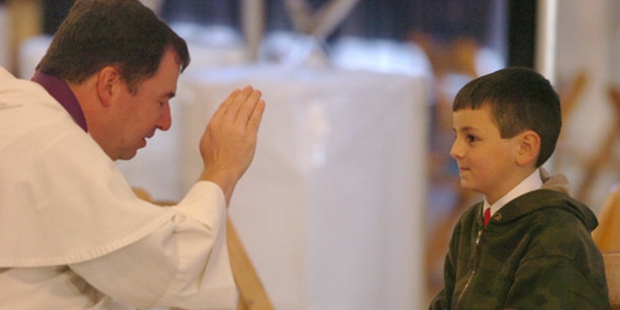One of the joys (and chores) of a Catholic priest is to hear confessions. I say “chore” because it is tiring to sit there for hours listening to what seems the same old stuff. I realize that for the penitent it is a guilty and often shameful worry and a great relief to make one’s confession for I too am a penitent. I only express this very human feeling that I sometimes experience–but this human weariness disappears as I reflect on the joy and wonder of the sacrament.
This is hammered home to me each year as I hear the first confessions of our first Holy Communion children. There they are, year after year coming to the age of reason and clearly they have come to think about themselves and their sins. Of course they have done very little that is really bad. Some naughtiness, some disobedience, the usual stuff of early childhood. But what is so moving is that they are there, already doing their duty as little Catholics and are mostly excited by the opportunity. I share their joy.
The genius of confession is that, when one comes to confession we are not simply confessing the bad things we’ve done and receiving forgiveness. Perhaps most importantly, we are taking responsibility for ourselves. We are admitting that it is our fault. We can’t blame someone else. How different this is from so many forms of psychological counseling and popular self help programs in which the troubled person is encouraged to dig around to find what happened to them–how they were abused or disadvantaged–and how someone else or some other circumstances are responsible for their difficulties. Of course sometimes other ARE involved, and counseling can help to bring those problems to light, but it is confession in which the person (no matter who is to blame) takes responsibility and says, “I will do something about this.”
I remember working once with a young man who hated his mother. She was indeed an abusive and horrible mother, but in counseling he wanted to confess this but pleaded with the counsellor, “I can’t confess my mother’s sins!”
“True” said the counsellor, “But you confess your hatred of your mother and receive healing”
This is the genius of confession–that ordinary men and women, boys and girls are accepting the reality of being responsible for themselves. This, I believe, is the underlying genius of Christianity. In a world in bondage to fatalism, Christ steps in and says, “You are not in bondage to the whims of the gods. You are not in bondage to powers beyond your control. You are not in bondage to the fates. You can take responsibility. You must take responsibility for yourself, for your world and for your eternal destiny. This begins by being penitent. When you confess your sins you are automatically saying, “It’s me. I take the blame and I take the responsibility.”
The genius of this is that in doing so we are also saying, “Although I take the responsibility I also admit that I cannot do it myself so I am asking for divine assistance.” This is the transaction we call “faith”. A simple soul saying, “I am taking responsibility for myself, but dear God, I need some help.”
That this basic and essential viewpoint is being learned experientially by seven and eight year old children is awesome. It is this lesson perhaps more than any other, which will give them a head start in life.
To elaborate on this, this is also the lesson that so many in our contemporary society have never learned. This is obvious when we see the sense of entitlement and blame that is at epidemic proportions in our society. Multitudes expect someone else to take responsibility for them, to solve their problems, to give them everything, and when that doesn’t happen they blame the ones who they think owe them something. Then the blame gets ugly. They see themselves as victims. They nurture resentment and before long it turns violent.
How does the Catholic faith change the world? Maybe therefore it is as simple as Father going into the confessional, switching on the light and listening to the first confessions of second graders.







Just finished reading “The Way of the Wilderness Warrior”. Wonderful story full of personal insights for the reader. I plan to read it again.
Thanks for the feedback. It would be great if you could take the time to write a review at Amazon!